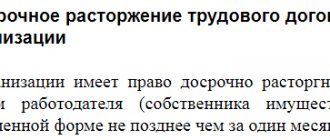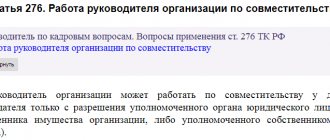Text of Article 77 of the Labor Code of the Russian Federation in the new edition.
The grounds for termination of an employment contract are: 1) agreement of the parties (Article 78 of this Code); 2) expiration of the employment contract (Article 79 of this Code), except for cases where the employment relationship actually continues and neither party has demanded its termination; 3) termination of an employment contract at the initiative of the employee (Article 80 of this Code); 4) termination of an employment contract at the initiative of the employer (Articles 71 and 81 of this Code); 5) transfer of an employee, at his request or with his consent, to work for another employer or transfer to an elective job (position); 6) the employee’s refusal to continue working in connection with a change in the owner of the organization’s property, a change in the jurisdiction (subordination) of the organization or its reorganization, or a change in the type of state or municipal institution (Article 75 of this Code); 7) the employee’s refusal to continue working due to a change in the terms of the employment contract determined by the parties (part four of Article 74 of this Code); the employee’s refusal to transfer to another job, required for him in accordance with a medical report issued in the manner established by federal laws and other regulatory legal acts of the Russian Federation, or the employer’s lack of relevant work (parts three and four of Article 73 of this Code); 9) the employee’s refusal to be transferred to work in another location together with the employer (part one of Article 72.1 of this Code); 10) circumstances beyond the control of the parties (Article 83 of this Code); 11) violation of the rules for concluding an employment contract established by this Code or other federal law, if this violation excludes the possibility of continuing work (Article 84 of this Code). An employment contract may be terminated on other grounds provided for by this Code and other federal laws.
2) expiration of the employment contract (Article 79 of this Code), except for cases where the employment relationship actually continues and neither party has demanded its termination; 3) termination of an employment contract at the initiative of the employee (Article 80 of this Code); 4) termination of an employment contract at the initiative of the employer (Articles 71 and 81 of this Code); 5) transfer of an employee, at his request or with his consent, to work for another employer or transfer to an elective job (position); 6) the employee’s refusal to continue working in connection with a change in the owner of the organization’s property, a change in the jurisdiction (subordination) of the organization or its reorganization, or a change in the type of state or municipal institution (Article 75 of this Code); 7) the employee’s refusal to continue working due to a change in the terms of the employment contract determined by the parties (part four of Article 74 of this Code); the employee’s refusal to transfer to another job, required for him in accordance with a medical report issued in the manner established by federal laws and other regulatory legal acts of the Russian Federation, or the employer’s lack of relevant work (parts three and four of Article 73 of this Code); 9) the employee’s refusal to be transferred to work in another location together with the employer (part one of Article 72.1 of this Code); 10) circumstances beyond the control of the parties (Article 83 of this Code); 11) violation of the rules for concluding an employment contract established by this Code or other federal law, if this violation excludes the possibility of continuing work (Article 84 of this Code). An employment contract may be terminated on other grounds provided for by this Code and other federal laws.
Part lost force on October 6, 2006 - Federal Law of June 30, 2006 N 90-FZ.
N 197-FZ, Labor Code of the Russian Federation, current edition.
"Correct" article
Despite the basic basic principles of legal acts, namely “absolute clarity in wording,” misunderstandings very often arise. Under what article should dismissal be made? Clause 3 Art. 77 or art. 80 Labor Code of the Russian Federation?
But in fact there is no problem in understanding here. One is considered procedural (how to legally change jobs correctly), and clause 3 of Art. 77 of the Labor Code of the Russian Federation – normative, i.e. indicates the fact itself.
Almost everyone knows that you need to work for 2 weeks before leaving the organization. Let us immediately clarify one very important nuance.
Dismissal (clause 3 of Article 77 of the Labor Code of the Russian Federation) does not provide for any work.
You just need to notify the employer no later than this period. Of course, during this period you will have to perform your functions at the enterprise. Hence the erroneous opinion. But let us clarify that compulsory work for half a month is optional.
You can go on sick leave or vacation, warning your employer about future dismissal. In this case, there can be no processing.
Clause 3 art. 77 Labor Code of the Russian Federation: entry in the work book
The most common mistake is incorrect entry. Very often, clerks incorrectly indicate the article in the work book. After this, many former employees face a problem during new employment or when applying for a pension. Clerks put Fr.
But the legislation does not provide for the termination of obligations on the basis of this article. It is important to see the order to terminate the contract. If it is based on the same article, then legally the employee is not fired, because legal procedure was not followed.
Hence the problem for the former employee: he may not be hired for the new position. It is imperative to contact your former organization for correction. The document must contain the following entry: clause 3, part 1, art. 77 of the Labor Code of the Russian Federation (termination of an employment contract at the initiative of the employee).
But let's move on to another common mistake.
Issuance of an order by the manager
The document that formalizes dismissal is an order. It is published on the day the citizen ends his work in this organization. From the moment the order is signed by the manager, the employee is considered dismissed.
The general form of the form for issuing an order: T-8 - for one employee, T-8a - for several.
order to terminate an employment contract with an employee free of charge in word format
The law does not oblige you to adhere to this particular format, the main thing is that all the necessary information appears in the text:
- employer's name and organization code in the OKPO system,
- registration number of the order and date of its execution,
- details of the contract concluded with the employee upon hiring,
- the date from which the person is considered dismissed,
- Full name of the citizen and personnel number,
- the position of the employee with clarification of the department, if any,
- grounds for termination of the contract (clause 3, part 1, article 77 of the Labor Code of the Russian Federation),
- documentary basis for termination of the contract - a statement,
- signature of the manager and signature of the citizen in the acquaintance.
Clause 3 Art. 77 Labor Code of the Russian Federation: entry into the labor record. Writing sample
Clerks and directors often face a similar problem. The article seems to be indicated accurately, but the entry is still invalid. The fact is that the wording is as follows: “P. 3 tbsp. 77, dismissal of one’s own free will.”
But according to the rules for filling out the entry must fully comply with the norms of the Labor Code of the Russian Federation.
Therefore, the writing sample will look like this: “Dismissed under clause 3 of Art. 77 of the Labor Code of the Russian Federation - termination of an employment contract at the initiative of the employee.”
The record is radically modified, although the underlying reason remains the same.
Features of termination of the contract under clause 3 of Art. 77
When dismissing an employee due to his own expression of will, one should be guided by two norms of the Labor Code of the Russian Federation - paragraph 3 of part 1 of Article 77 (general list of grounds) and Article 80 (special regulation), also taking into account the commentary to the second of them.
According to Art. 80 of the Labor Code of the Russian Federation, the rules are as follows:
- the employee has the right to terminate his employment relationship with the employer if he notifies this in writing at least 2 weeks before the expected end of work,
- the period for informing the employer in some cases may be different, if this is stipulated by law,
- in some cases, when the termination of the contract is caused by a situation that does not depend on the employee’s actions (for example, his admission to a university as a full-time student) or related to the unlawful behavior of the employer, the employee has the right to independently choose the period for informing the administration about his resignation,
- the final day of work is the day of full financial settlement with the dismissed person and the delivery of his work book and other documents listed in the law,
- an employee who has announced his resignation may withdraw his application before the end of his service period, except in cases where a new specialist has already been invited to this position,
- if the employee changes his mind and does not want to terminate the contract, it continues in effect.
Deduction for vacation used in advance upon dismissal.
Consent of the parties: what is the difference?
There are situations when an employee is forced to write a letter of resignation of his own free will. The reasons, of course, are purely individual. The new director is selecting personnel, the employee is no longer happy, there is a reorganization, pregnant women are often forced to do this, etc. The Labor Code has two paragraphs of Article 77, which seem equivalent to ordinary citizens:
- By agreement.
- At your own request.
Many professional lawyers involved in labor disputes know that termination of a contract in the second case can be challenged in court. It is enough to provide arguments and prove that the employee was subjected to psychological influence by the administration of the enterprise. Consequently, the termination order will be canceled in court, and the employee will be reinstated with all rights.
Clause 1 art. 77 of the Labor Code of the Russian Federation does not provide for such a loophole. It just follows from the fact that the employee and the employer have any conflicts and disagreements.
As a rule, the former employee is paid some kind of “compensation” funds in order to terminate the employment relationship peacefully and without consequences for both parties. In court, all arguments will be useless. It is almost impossible to regain your labor rights.
Application form
resignation letter of one's own free will in word format
The list of unified forms does not contain a statement of termination of the employment contract. Therefore, situations in which an application is refused to be accepted due to non-compliance with the mandatory form are practically excluded.
Moreover, the law prohibits such an approach in paragraph 3 of part 1 of Art. 77 Labor Code of the Russian Federation. However, HR departments usually have templates on which employees are encouraged to write their own application.
Since an order will be issued based on the application in the future, it is necessary that the text contain:
- position and surname with the initials of the head of the employing organization,
- the basis for termination of the contract is here: one’s own desire,
- reference to the article of the Labor Code (Article 80),
- date of the final day of work. Since we are talking about leaving at the request of a citizen, it is he who must determine the day of completion of the work. The employer does not have the right to do this. This point was clearly stated by S. A. Panin in the commentary to the Labor Code of the Russian Federation of 2002, edited by him,
- Full name and position of the employee,
- date of application and signature of the applicant.
If the applicant has grounds for reducing the employer's normal two-week notice period, he must refer to this in the application.
Please note! The application must be accepted with the appropriate mark on it with the date of acceptance. If the employer's representative refuses to do this, you will have to send the application by registered mail with notification. However, you need to remember that the working period in this case will begin from the day the employer receives the registered letter.
If you change your mind, what should you do?
Such cases are also not uncommon. The reasons can be different: there was no agreement on a new place of work, the director realized that the employee really wanted to leave, and improved working conditions and much more.
To cancel an application that has already been submitted, you must write and also officially register a new one in accordance with all the rules. No matter how good the relationship between him and the employer may seem to the employee, it is important to know the main rule: the application for refusal of dismissal must be submitted officially, i.e. in writing through a secretary or by mail.
What is it for?
There are often cases when the employer is not against such dismissal. But he had no reason to do it himself. And then the employee himself brings such a letter of resignation under clause 3 of Art. 77 Labor Code of the Russian Federation.
Then after some time the employee announces that he has changed his mind. The director, knowing the legislation, says with joy on his face that “I understand everything, continue working.”
After a two-week period from the date of writing the application, a dismissal order is issued in accordance with clause 3 of Article 77 of the Labor Code of the Russian Federation - at one’s own request.
There is no use going to court. Legally, the director did everything correctly. One of the principles of law was at work here: “Most moral principles become legal norms, but not all.”
When refusing an application of your own free will, there is one very important nuance. If, from the moment the employee was fired until his refusal, a written invitation was sent to another person to accept this position, then it will no longer be possible to cancel it.
Here the law will be on the side of the future employee, i.e. someone who has already been invited. Because Now no one has the right to refuse him employment.
Therefore, it is necessary to weigh everything carefully before writing a letter of resignation. There are times when there is no way back.
Commentary to Art. 77 Labor Code of the Russian Federation
Comments on articles of the Labor Code will help you understand the nuances of labor law.
§ 1. Termination of an employment contract - termination of the employment relationship between the employee and the employer. This differs from the removal of an employee from work, when the employee’s performance of his labor function is only suspended. In this case, as a rule, wages are not paid for the period of suspension (see Article 76 and commentary thereto). Termination of an employment contract means the dismissal of an employee.
In accordance with the conceptual apparatus, the legislator uses three terms: “termination”; "termination"; "dismissal" The first two terms are used in relation to an employment contract. Moreover, the term “termination” is broader than “termination”. The concept of “termination of an employment contract” is applied in cases where the contract is terminated at the initiative of the employee, or the employer, or by agreement of the parties to the employment contract. The term “dismissal” is used in relation to a specific employee (for example, engineer M.I. Ivanov was fired at the initiative of the employer under clause 2, part 1, article 81 of the Labor Code of the Russian Federation).
The commented article contains common grounds for termination of an employment contract for all employees.
§ 2. Clause 1 part 1 art. 77 of the Labor Code provides for such a basis as by agreement of the parties. It reflects the contractual nature of labor: by agreement of the parties, as a rule, an employment relationship arises, and by their agreement it is terminated at any time.
On termination of an employment contract, see Art. 78 TC and commentary to it.
§ 3. According to clause 2, part 1, art. 77 of the Labor Code, the basis for termination of an employment contract is the expiration of the term of the employment contract (Article 79 of the Labor Code), except for cases where the employment relationship actually continues and neither party has demanded its termination. See Art. 79 and commentary thereto.
§ 4. According to clause 3, part 1, art. 77 of the Labor Code, an employment contract is terminated at the initiative of the employee (Article 80 of the Labor Code and commentary thereto).
§ 5. In accordance with clause 4, part 1, art. 77, there is termination of the employment contract at the initiative of the employer (see Articles 71 and 81 of the Labor Code and comments to them).
§ 6. Clause 5 Part 1 Art. 77 of the Labor Code, which establishes such grounds for termination of an employment contract as the transfer of an employee with his consent or at his request to another employer, is applied when there is a clearly expressed written will of three subjects: the administration of the new place of work, inviting to work, the given employee, the transferring from one place of work to another in the order of transfer, and the administration of the previous place of work releasing this employee in the order of transfer to another organization. Then the employment contract with him is terminated at his previous place of work under clause 5, part 1, art. 77. At the new place they can no longer refuse to hire him (see Article 64 of the Labor Code and the commentary thereto).
Clause 5, Part 1, Art. 77 of the Labor Code contains another basis for termination of an employment contract - transfer to an elective job (position). For this basis, an act of election of this employee to an elective job (position) exempt from production work is required. The previous and this grounds for dismissal, as we see, differ significantly from each other. Therefore, in the dismissal order and in the employee’s work book there should be a reference not just to clause 5 of Art. 77 of the Labor Code, and with clarification on which of these two grounds the employee is dismissed.
§ 7. Clause 6 part 1 art. 77 of the Labor Code provides for such grounds as the employee’s refusal to continue working in connection with: a) a change in the owner of the organization’s property; b) with a change in the jurisdiction (subordination) of the organization; c) with the reorganization of the organization (Article 75 of the Labor Code). All three cases have now become quite common. For more details, see Art. 75 and commentary thereto.
§ 8. Clause 7, Part 1, Art. 77 of the Code establishes the general basis for dismissal, which was introduced in 1988 in paragraph 6 of Art. 33 of the Labor Code as supplemented. This is “refusal to continue work due to a change in the terms of the employment contract determined by the parties” (see commentary to Article 74 of the Labor Code). Now the Code has included this basis in a separate paragraph. Such a refusal by the employee may occur if he was offered another job in the same organization or if there was no corresponding work after he refused to continue working with a change in the essential terms of the employment contract. If there was another job, but the employee was not offered it, having learned about this, he can file a lawsuit to reinstate him in the unoffered job, and the court, having established such a violation of Art. 74 of the Code will satisfy his claims.
§ 9. Clause 8, Part 1, Art. 77 Labor Code - a new basis for dismissal. Previously, an employee who refused to be transferred to another job based on a medical report on his health condition was dismissed on the grounds of unsuitability for health reasons (clause 2 of Article 33 of the Labor Code). Selected paragraph 8 of Art. 77 grounds are more true and less likely to injure the employee, correctly reflecting the dismissal initiative.
§ 10. Enshrined in clause 9, part 1, art. 77 of the Labor Code the basis was previously contained in paragraph 6 of Art. 29 Labor Code. This is an employee’s refusal to be transferred to another location due to the employer (organization) moving there. In this case, the employee is paid severance pay in the amount of his two-week earnings (see Article 178 of the Labor Code and commentary thereto).
When an employer moves to another area (i.e., to another locality), the administration invites not everyone to move, but, as a rule, the main employees, and if one of them does not agree to the move, he is fired according to clause 9 Art. 77 due to refusal to move with the organization to work in another area. If the employee was not offered a move, he is dismissed under clause 1 of Art. 81 of the Labor Code with appropriate guarantees in connection with the liquidation of this organization in this area (see commentary to Article 81 of the Labor Code).
§ 11. Clause 10, Part 1, Art. 77 refers to Art. 83 “Termination of an employment contract due to circumstances beyond the control of the parties.” It provides for specific circumstances. Therefore, on clause 10, part 1, art. 77 they never make references either in the order or in the work book, since it is a reference.
§ 12. Clause 11, Part 1, Art. 77. The reasons for dismissal specified therein are discussed in detail in Art. 84 of the Labor Code on violation of the rules for concluding an employment contract established by labor legislation, if this violation excludes the possibility of continuing work. This new basis fills the gap in the Labor Code.
§ 13. Part 2 Art. 77 of the Labor Code provides that an employment contract may be terminated on other grounds provided for by the Code and other federal laws. For example, in Sect. XII of the Code specifies additional grounds for dismissal for teaching staff and organizational leaders. There are additional grounds for the dismissal of federal civil servants, judges, and prosecutors, provided for by the relevant federal laws. It should be noted that Art. 77 contains a non-exhaustive list.
Where to defend labor rights
If during the dismissal procedure or in any other case that arose during the employment relationship, your rights were violated, then you need to defend them in one of the following ways:
- Contacting the Labor Rights Protection Inspectorate.
- Statement of claim to court.
- Contacting the prosecutor's office.
A citizen of the Russian Federation whose rights have been violated may appeal simultaneously to all competent authorities. Administrative punishment is provided for the guilty person. But the citizen himself does not have the right to initiate such a case through the court. This can only be done by either the prosecutor's office or the labor inspectorate. To do this, you need to send a complaint to these structures.
In parallel, the employee has the right to file a lawsuit in order to receive compensation for moral damage or any other payment from the employer, if provided by law, because administrative sanctions do not provide for this. All fines issued by the prosecutor's office will go to the state. Therefore, it is better to contact the regulatory authorities in order to bring the offender to justice and go to court for moral or other payments.
Cases exempt from service
The Labor Code contains reasons that allow an employee to leave before the due date of 14 calendar days. Let's say right away that the report begins the next day after the relevant notification is submitted.
These include:
- Employee training.
- Mutual agreement.
- Violation of labor rights.
- Other.
The first two are more or less clear. As for violation of labor rights, what is meant is not the subjective opinion of the employee. This refers to the official holding of the employer to responsibility. And it must necessarily concern the employee who decided to leave earlier than expected.
When will the payment be made?
After an official order, all payments for time worked must be made on the day of dismissal. And this is not a “gift” from the company, it is an obligation according to the Labor Code. Violation of this norm is a reason to defend your rights and contact regulatory authorities. In addition to salary, the employee is entitled to payment for unused vacation. You can calculate it yourself if you know your average monthly earnings and the exact number of days worked. Payments under it must also be made on the day of the dismissal order.
The only exception to this rule is sick pay. From the moment the medical certificate is provided, the accounting department recalculates within 10 days and pays it on payday at the enterprises.
If the employee is not on site on the day of payment (business trip, vacation, sick leave), then all payments must be made no later than one day after his request.
Calculation procedure
The legislator obliges to complete all settlements with the employee on the day of completion of his activities in the organization. Then his work book is returned to him. If this order is violated, a citizen has the right to consider his interests significantly violated and count on full compensation for all types of damage - both financial and moral.
Interest is accrued for each day the payment deadline is missed. In addition, the law provides for fines for late payment, which apply to the organization itself, its management, and responsible employees.
The calculation includes the following amounts:
- accrued salary at the time of leaving, but not paid,
- compensation for unused vacation periods, according to Art. 127 Labor Code of the Russian Federation,
- payments based on sick leave certificates submitted by the employee,
- other benefits and bonuses provided for by laws (for certain cases of dismissal) and acts of the organization.
All payments are made on the last day of work, with the exception of sick leave payments. The law allows you to pay it not on the day of dismissal, but later, on the day of payment of wages to employees following the date of dismissal, in cases where the period between the submission of sick leave and the day of payment of wages was more than 10 days.
In addition, the law imposes on the employer the obligation to pay for sick leave provided by dismissed employees within a month from the date of termination of work, unless they have taken a job in another organization.
Keep in mind! If a citizen does not show up for service on the day of payment, all payments to him must be made the next day after he makes the relevant demands. A work book is an important document. If the employee does not show up to receive it, he is sent a registered letter offering to pick up the book or allow him to send it by mail. Receipt of receipt of the letter should be retained.




